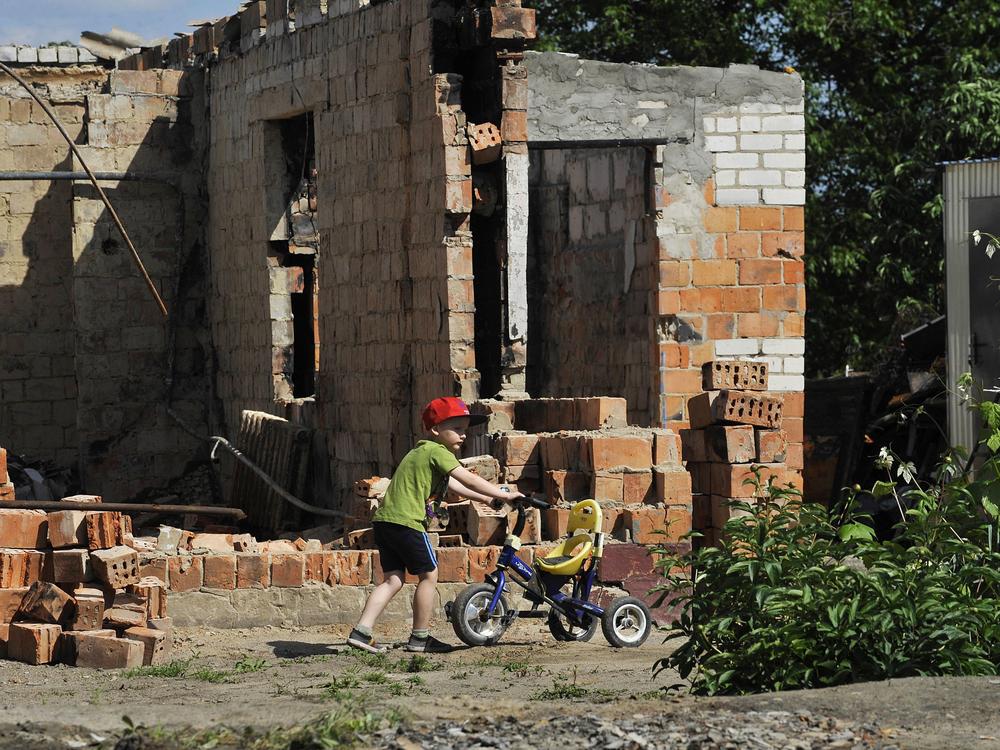Loading...
Section Branding
Header Content
Russia-Ukraine war: What happened today (June 3)
Primary Content
As Friday draws to a close in Kyiv and in Moscow, here are the key developments of the day:
It's the 100th day of Russia's full-scale invasion of Ukraine, with no end in sight to the war. The fighting has killed thousands, forced millions to flee the country and left Ukrainian cities in ruins. Both Russia and Ukraine have claimed some successes and losses. In recent weeks, Russia has focused its efforts in the east and south, now controlling one-fifth of Ukraine. In the eastern Donbas region, Russian troops are making gains in a grinding artillery battle as Ukraine awaits new shipments of longer-range and heavier weaponry from the West. The war has had global ripple effects, and cease-fire negotiations have stalled.
More than 2 million Ukrainians have crossed back into the country since the heaviest violence shifted away from the capital, Kyiv, and other population centers. The European Union's border agency, Frontex, said now more people have started going back to Ukraine than are leaving. But the United Nations refugee agency still says Ukrainians are experiencing "the largest human displacement crisis in the world today," with 7.1 million people displaced within Ukraine and more than 6.5 million refugees.
Russian troops occupying the Ukrainian city of Mariupol are still detaining civilian men and sending them to overcrowded camps in the area, according to the city's Mayor Vadym Boichenko. He told reporters in Kyiv that 100,000 residents remain in his devastated port city, now under full Russian control. Boichenko, who fled before Russian forces captured Mariupol, says food and drinking water are scarce and there's no electrical power or cellphone service. Thousands of bodies are buried in shallow, makeshift graves.
Russian President Vladimir Putin accused the West of "shifting the responsibility" on Russia for a looming global food crisis. Russian forces have occupied much of Ukraine's coastline, but the Kremlin blames the blockages of food shipments on Western sanctions and on Ukraine's defensive mining of Black Sea ports. After a meeting with Putin, Senegal's President Macky Sall, who leads the African Union, tweeted that Russia's leader "expressed readiness to facilitate" wheat exports. Speaking to state TV, Putin said Russia wouldn't attack grain shipments if Ukraine demined the waters, or that exports could go through Belarus, which would require lifting of sanctions on that country.
The European Union stepped up sanctions on Russia, including against Russian military commanders the bloc describes as the "butchers" of Bucha and Mariupol, cities where Ukraine blames Russian forces for atrocities. The new blacklist also includes former gymnast Alina Kabaeva, described as "closely associated" with Putin; the adult children of Kremlin spokesperson Dmitry Peskov; and Arkady Volozh, who immediately stepped down as CEO of Russian tech giant Yandex. All this came a day after the U.S. rolled out new sanctions on Russian officials and oligarchs.
In-depth
A digital conflict between Russia and Ukraine rages on behind the scenes of war.
Tensions around the war in Ukraine are impacting the sports world.
Biden's move to send advanced weapons to Ukraine raises questions about U.S. involvement in the war.
Has military support for Ukraine from the U.S. and NATO peaked?
Special report
Russia's war in Ukraine is changing the world: See its ripple effects in all corners of the globe.
Earlier developments
You can read more daily recaps here. For context and more in-depth stories, you can find more of NPR's coverage here. Also, listen and subscribe to NPR's State of Ukraine podcast for updates throughout the day.
Copyright 2022 NPR. To see more, visit https://www.npr.org.

